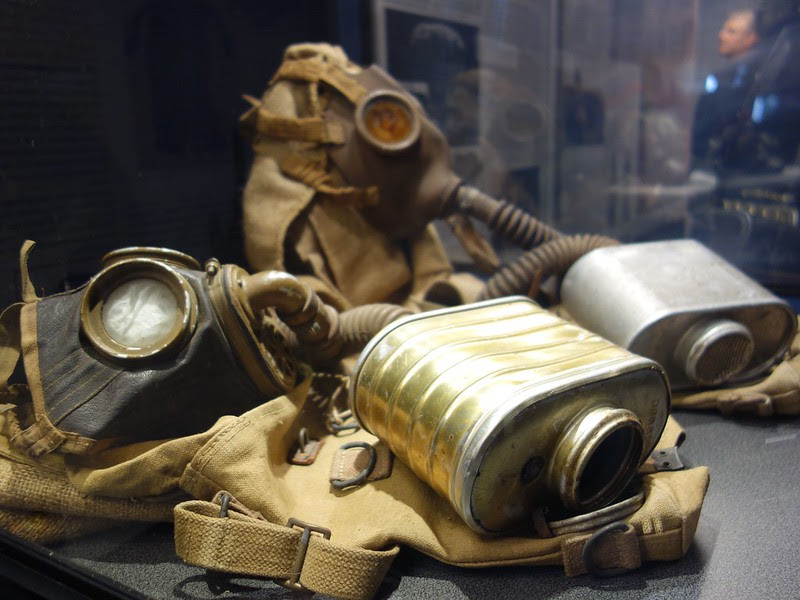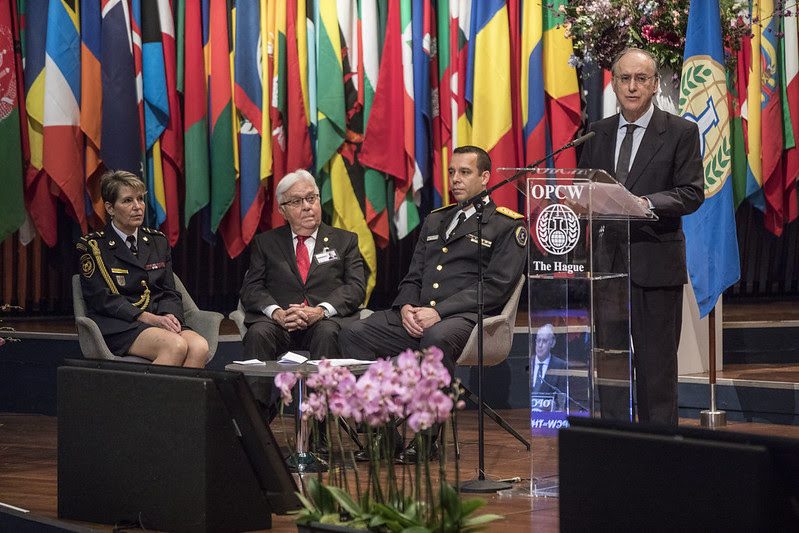US Formally Alleges Russian Use of CW in Ukraine
On May 1, the United States Department of State published a press release that formally alleges that Russia has used a banned chemical choking agent and has used riot control agents in violation of the CWC in its war in Ukraine. The United States also announced it is sanctioning hundreds of individuals and entities as a response to these accusations.
In its statement, the United States cites multiple instances of unlawful use of riot control agents on the battlefield and the use of the banned choking agent chloropicrin by Russian troops, both of which would constitute violations of the CWC. The U.S. statement prompted a response from Russian officials, who denied the U.S. charges.
On May 7, the OPCW issued a statement on the matter, stating that both Russia and Ukraine had reported allegations of chemical weapons use to the Organisation, but that “the information provided to the Organisation so far by both sides, together with the information available to the Secretariat, is insufficiently substantiated.” The statement also noted that “the OPCW will continue to provide support to Ukraine, upon its request, in the field of assistance and protection against chemical weapons under Article X of the Convention.” However, according to the OPCW, up to this point, neither Russia nor Ukraine have followed up with the OPCW to request technical assistance or an investigation.

World War I era gas masks on display in Ieper, Belgium. Chloropicrin was first used as a chemical weapon during World War I. Source: OPCW Flickr.
In April, the Ukrainian parliament approved a bill ratifying an “additional agreement creat[ing] the legal basis for deepening technical cooperation between Ukraine and the OPCW, for carrying out technical assistance visits, in particular, for analyzing samples of toxic chemical agents that the aggressor state (Russia) used, was preparing to use or may use against military personnel of the Armed Forces and/or the civilian population of Ukraine.”
For in-depth analysis of the implications of the use of banned agents, the U.S. accusations, and potential non-compliance, read Jean Pascal Zanders’ latest blog posts in The Trench: Chloropicrin and its alleged use in the Ukrainian war (Part 1).
CWC Coalition Statement on Alleged CW Use by Russia in Ukraine
On May 14, the CWC Coalition released a response to the United States’ formal allegations of CW use in Russia’s war on Ukraine, which was shared on our website and X account.
The statement, which was signed by more than two dozen CWC Coalition members, calls on all States Parties to the CWC to abide by the treaty, urges states to initiate an investigation into the accusations, and calls on Russia and Ukraine to fully cooperate. Read the full statement here.
OPCW-The Hague Award 2024 Open for Nominations
The OPCW is now accepting nominations for this year’s OPCW-The Hague Award, which annually recognizes “the numerous stakeholders, including academia, researchers, the chemical industry, international and regional organizations, and civil society, who make outstanding contributions to achieving a world free of chemical weapons.”
The award was established by the OPCW in 2014 in participation with the Municipality of The Hague as part of its 2013 Nobel Peace Prize win. The OPCW-Hague Award continues the legacy of “extensive efforts to eliminate chemical weapons” for which the OPCW was recognized and awarded the Nobel Recipients of the award receive a medallion, a certificate, and a share of the €90,000 award fund.
If you would like to put forward a nomination, the link and helpful guide can be found on the OPCW’s website. You can nominate a candidate here. Nominations will be accepted until July 31, 2024.
See past winners of the award, including: Hubert Foy, Director of the African Center for Science and International Security (2023); the CWC Coalition (2022); Alistair Hay, Professor of Toxicology (2015) and more.

Award ceremony for the 2022 OPCW-Hague Award, where CWC Coalition Chair Dr. Paul Walker received the award on behalf of the Coalition. Source: OPCW Flickr.
On the Calendar
- July 9-12, 2024: 106th Session of the OPCW Executive Council, The Hague
- July 31, 2024: 2024 OPCW-The Hague Award nominations deadline
- October 8-11, 2024: 107th Session of the OPCW Executive Council, The Hague
- November 25-29, 2024: 29th Conference of States Parties to the Chemical Weapons Convention, The Hague
| News Roundup |
- News of Note
- “Rada ratifies extra agreement between Ukraine, Technical Secretariat of Organsation for Prohibition of Chemical Weapons,” Interfax-Ukraine, April 24, 2024
- US accuses Russia of using chemical weapons in Ukraine war, Al Jazeera, May 2, 2024
- OPCW workshop on Chemical Weapons Convention and peaceful uses of chemistry encourages youth to take up careers in chemistry and chemical non-proliferation, OPCW News, May 6, 2024
- “Burning Skin, Teary Eyes: Ukraine’s Troops Say Russia Is Using a Banned Toxic Gas,” The Wall Street Journal, May 23, 2024
- Military: Russian forces using chemical weapons to storm Ocheretyne, situation ‘difficult,’ The Kyiv Independent, May 23, 2024
- OPCW Director-General meets European Union Special Envoy for Non-Proliferation and Disarmament, OPCW News, May 23, 2024
- Other News
- OPCW workshop in Lisbon enhances national implementation of the Chemical Weapons Convention, OPCW News, March 27, 2024
- Surviving Halabja: Yerevan Saeed’s Story, Kurdistan Chronicle, May 11, 2024
- OPCW Director-General meets Minister of Interior of the State of Palestine, OPCW News, May 23, 2024
- Reports
- Condition (10)(C) Annual Report on Compliance with the Chemical Weapons Convention (CWC), United States Bureau of Arms Control, Deterrence, and Stability, April 4, 2024
- Guidance for Fishermen Encountering Munitions at Sea: Chemical Weapons Elimination, Center for Disease Control, May 14, 2024
- Statements
- Statement on Ukraine from the OPCW Spokesperson, OPCW News, May 7, 2024
- Resources